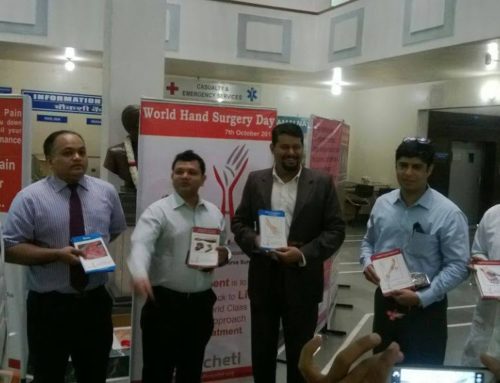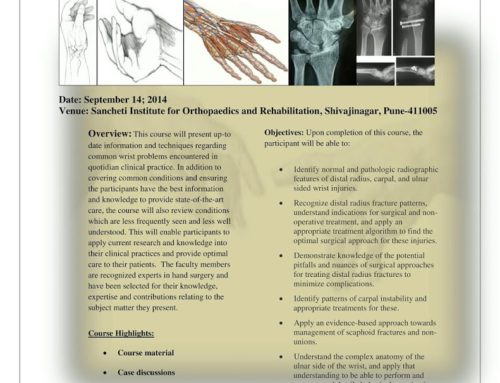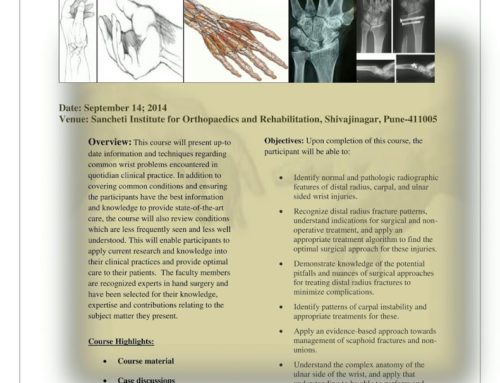
Payal (name changed), a young, dynamic IT professional; has been suffering from chronic, relentless pain in her right neck, shoulder and radiating down to her elbow & wrist. The pain is often accompanied with a pins & needles sensation in the fingers, and this often makes it impossible for her to continue working. She often complains of low back ache too. Dwelling deeper into her work habits and work station setup, she admits, that she sits for a very long time at her desk, often in a slouched manner, staring continuously at the monitor, working away at her keyboard (which in fact translates “the fingers are walking miles together!!!). She then also tells that she is very health conscious and is a “regular” at the gym and yoga classes. When asked about her exercise training, she does not warm up nor stretch and there are no cool-down sessions post exercise. Her yoga is pretty much “à la carte” and not very scientific. She has sought help from various physicians, yoga teachers, and alternative medicine practitioners, has been on splints, has been given steroid shots, and has been on medication and non specific physiotherapy. One of her doctors even told her that there is nothing wrong with her hand, her problem lies entirely in her head and that she should see a psychiatrist. To add fuel to the fire, all her lab tests and investigations are inconclusive. In summary; she has “been there & done that” to seek relief from her debilitating pain.
Does this story relate to you?If yes, then you are not alone because this is the story of millions of young IT professionals across the world and back home in our country too. This is a prototype story of people like you & me suffering from what is labeled as “Repetitive Strain Injury”.
Repetitive Strain Injury (RSI) is an umbrella term for a number of overuse injuries affecting tissues (muscles, tendons, nerves and bones) of the neck, upper and lower back, chest, shoulders, arms and hands, “caused” by a variety and awkward or static postures.
· RSI is a significant occupational health problem.
· Despite its increasing prevalence, RSI is poorly understood by workers, employers and the medical profession.
· Early intervention is critical in keeping these injuries from progressing to permanent disorders, which prevent their sufferers from working or leading normal lives.
· There is a strong need to raise public awareness about RSI to prevent further injuries and to promote understanding and acceptance for those with RSI.
· In the last decade, hundreds of thousands of otherwise healthy individuals have developed a painful, debilitating and sometimes disabling condition known as Repetitive Strain Injury (RSI).
· RSI is a multifactorial complaints syndrome affecting the neck, upper back, shoulder, upper and lower arm, elbow, wrist or hand, or a combination of these areas, which leads either to impairment or to participation problems. The syndrome is characterized by disturbance in the balance between load and physical capacity, preceded by activities that involve repeated movements or prolonged periods spent with one or more of the relevant body parts in a fixed position as one of the presumed etiological factors.
· RSI is a diffuse disorder of muscle, fascia, tendon and/or neurovascular structures. Some sources include disorders of the lower back and lower extremities in the definition of RSI.
· RSI is also known as Work Related Musculoskeletal Disorder (WRMSD), Cumulative Trauma Disorder (CTD), Computer Related Injury (CRI), Work Related Upper Limb Disorder (WRULD), and Occupational Overuse Syndrome (OOS).
High Risk Groups
· Computer Users
· Musicians
· Health Professionals: Surgeons, Dentists, Nurses, Massage Therapists
· Laboratory Workers
· Teachers
· Manual Laborers
· Assembly Line Workers
· Check out Clerks
· Hairdressers
· Butchers
· Sports persons
· Children
· Housewives
Prevalence
· 15-25% of all computer users worldwide (both vocational and recreational) are estimated to have RSI. By this estimate, over 5 million Indian computer users (out of an estimated 28 million) may already be having RSI.
· RSI accounted for 66% of all work-related illnesses in USA (1999).
· A study of 200 software professionals in Delhi in 2005 revealed that over 78% had musculoskeletal symptoms (Suparna K, et al). Why should you bother about RSI?
· If you are reading this, even YOU could be at risk! NO ONE is immune to RSI: whether you are a week old in the industry or whether you are the C.E.O.
· RSI can seriously disrupt work and domestic life. We know of over 100 young Indian computer professionals who have lost their jobs due to advanced, neglected RSI, since 2001.
· RSI is not a compensated occupational illness in India, even though over $250 billion are spent every year in USA as a consequence of RSI. There are no protective laws once workers get injured and are unable to work productively. The onus of RSI prevention is entirely on creating awareness among Indian workers.
· If RSI is not diagnosed and treated correctly and at an early stage, it can also lead to a dreaded and crippling complication called Reflex Sympathetic Dystrophy.
Social costs of RSI | Economic costs of RSI |
Diminished health | Decreased productivity & quality |
Psychosocial consequences, e.g., anxiety,stress and depression | Lost wages |
Diminished community involvement | Absenteeism |
Diminished ability to participate in recreational activities | Doctor visits, cost of medical procedures and ergonomic modifications |
Overall diminished quality of life | Employee turnover |
| Recruiting and training new staff |
| Retraining injured workers |
| Decreased employee morale |
| Compensation expenditures |
Current Scenario in India
· Early identification of RSI and competent medical intervention is critical to arrest and reverse the injury in its early stages
· 75% of Indian Computer Users report pain/numbness
· Over 30 young Indian IT/ITESProfessionals have lost their jobs because of advanced R S I
· 55% of Indian Computer Users got injured within a year of starting their first job
Top pitfalls in RSI Treatment
· Misdiagnosis as “Spondylitis, “Arthritis,” “Slipped Disc,” or “Muscle Sprain” seems to be the rule rather than an exception. Diagnosis of RSI is entirely based on a skilled musculoskeletal examination by an expert, and no “special” tests including MRI scans or nerve conduction studies can reliably diagnose it. · Inappropriate medications, e.g., corticosteroids (or Cortisone), antidepressants, Vitamin B12 and multi-vitamins, Unspecified Health Pills and Oils, etc. Medicines and potions (whether Allopathic or Alternative) make little or no difference in the long term. · Conventional physiotherapy is usually ineffective (Ultrasound, Short Wave Diathermy, etc.) and sometimes dangerous (traction and isometric/resistive neck exercises). · Inappropriate surgery for a presumed diagnosis of Carpal Tunnel Syndrome or Slipped Disc, with disastrous consequences. · Total reliance on fancy ergonomic gadgetry, special chairs, wrist rests, split keyboards, anti-glare screens, etc. to prevent RSI, while ignoring human factors (e.g., practical training in posture, body awareness, typing technique, breaks) · Often, RSI sufferers are told “it’s all in your mind” and the only way to recover is to get “it out of your mind!” No further clues are usually provided as to how to achieve this laudable goal. Worse, others are condemned to referral to a psychiatrist because the “specialist” could not find anything wrong on examination or investigations. · No significant attempts at identifying and correcting predisposing factors for RSI, e.g., ergonomic or postural problems. · Some modes like Yoga, when used appropriately (in the recovery stage rather than in the acute stage) and in a holistic environment, are beneficial in RSI. What Not To Do? - Ignore or deny you have a problem
- Take pain killers
- Join a gym or start weight training
- Undergo vigorous oil massages
- Take a vacation hoping the pain will go away with rest
What Could You Do? · Seek Professional Medical help · Meet Right Specialist for Right Solution How Can You Prevent RSI? ► Proper Workstation Setup · Postural Training · Neck Posture · Sitting Posture · Typing Posture · Use of Mouse ► Good Work habits · Take rest breaks · Practice good body mechanics · Exercise at work – Stretch ! RSI may be worse than you think, Prevent it before it causes permanent damage. Disclaimer: The Hand Surgery Clinics blog provides information of a general nature about the specialty of Hand and Upper Extremity Surgery. The information is provided with the understanding that Hand Surgery Clinics is not engaged in rendering hand surgery medical advice or recommendations. Any information on the blog should not be considered a substitute for consultation with a qualified hand surgeon to address individual medical needs. Your particular facts and circumstances will determine the hand surgery treatment which is most appropriate for you. |








